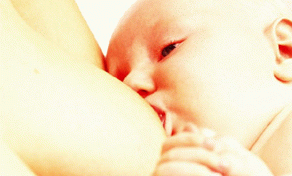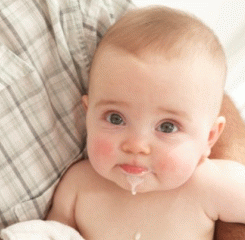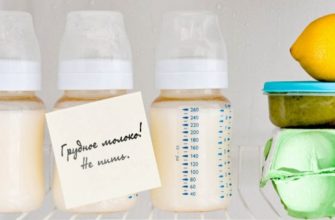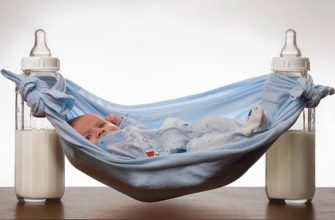 Each lactating mother faced such a phenomenon when their baby spits up milk after breastfeeding, and if the baby is on IV, then after taking the mixture. Basically, this is a normal physiological process in the development of a child, which does not particularly bother him, and with which the baby subsequently, developing physiologically, copes with it himself. In rare cases, regurgitation is a symptom of a disease that a specialist will help establish. Of course, young parents are worried about the reasons why the child is spitting up, so we will try to figure it out.
Each lactating mother faced such a phenomenon when their baby spits up milk after breastfeeding, and if the baby is on IV, then after taking the mixture. Basically, this is a normal physiological process in the development of a child, which does not particularly bother him, and with which the baby subsequently, developing physiologically, copes with it himself. In rare cases, regurgitation is a symptom of a disease that a specialist will help establish. Of course, young parents are worried about the reasons why the child is spitting up, so we will try to figure it out.
Vomiting is the process of ejecting milk from the stomach through the mouth. Is it normal for a baby to spit milk? It turns out, not always.
Causes of regurgitation
- The most common cause of regurgitation in an infant is overfeeding. Milk, which turned out to be superfluous, is naturally removed from the baby’s stomach;
- The cause of regurgitation after eating may be a violation of the intestines. For example, constipation or colic, which create obstacles to the normal passage of food;
- Incorrect technique of breastfeeding and, as a result, improper grip of the nipple, leading to the ingestion of air with milk, which, when it is lower than milk in the stomach, literally “shoots” it back (Seehow to breastfeed);
- Also, the reason for this is the insufficient development of the muscles of the esophageal sphincter. This valve is needed by a person so that food does not flow from the stomach into the esophagus. In adults, everything is so, the valve works fine. In infants, this sphincter is underdeveloped, it finally begins to function only by the year;
- Do not forget about the environmental reasons for what is happening. In modern living conditions, an infant may experience an allergic reaction to a product that adults consider natural. In fact, the fresh fruits and vegetables we buy are not always environmentally friendly;
- Improper behavior of parents who immediately after feeding begin to turn the newborn from side to side, squeeze, swing in a stroller, etc.
- In severe cases, the cause of regurgitation can be various diseases of the baby's digestive system, central nervous system or other pathological changes in the body.
Fountain
This type of regurgitation should alert mom. There may be several reasons for this:
- prematurity of the baby, whose digestive system works in slow mode;
- unsuccessful transition from breastfeeding to artificial;
- intestinal cramps that prevent food from moving normally through the intestines;
- deformation of the internal organs.
But not always spitting up with a fountain means the presence of some kind of pathology.Abundant regurgitation can occur for completely removable reasons.
However, if the child spits up frequently and suddenly, consult a doctor.
When breastfeeding
In the case when the baby spits up breast milk, you need to examine the spot. If the child burped with coagulated milk or the mass resembles cottage cheese, you can calm down. This is not vomiting. Pour a teaspoon of water next to the stain. If the spots are approximately the same in size - everything is normal. It is necessary to worry and consult a doctor if the baby spits up a lot.
- Stop overfeeding your baby if you do (Related article: how much milk should a newborn eat). With a well-established process of breastfeeding, the baby will eat as much as he needs. Feed on demand and do not give breasts when the baby is not asking. Also check for proper grip on the chest. If the baby swallows air, then spitting up is inevitable.
- Closely monitor the condition of the abdomen of the infant. It should not be swollen. A soft stomach and a calm baby are a guarantee that everything is in order.
- The chair also matters. Remember when he was last time. With these observations, you can eliminate the presence of constipation and colic in the baby (See the article on how often babies shit).
When feeding a mixture
If your baby spits up after a mixture, the reasons for this may be the same as those of breastfed babies.
- The primary reason is overeating. In a child with artificial feeding, the amount of food eaten is much easier to regulate. The amount of mixture in the bottle should strictly correspond to the age of the child.
- Check also the hole in the nipple. It should not be too big. In the process of feeding, it is important to avoid swallowing air, and for this, the nipple must be constantly filled with the mixture.
- Perhaps the baby spits up the mixture because it does not tolerate it. Try to pick something else together with your pediatrician. There are now milk formulas on sale that help prevent it from escaping from the stomach. (how to choose a mixture).
- You need to check the tummy according to the same principle as with natural feeding.
Video: Why does the baby “spit up” after feeding? 1 month old baby:
Answers the question: doctor - pediatrician Smirnova L.A.
First aid
[sc: ads]
If the child spits up lying on his back, there is a high probability of obstruction of the respiratory tract and the subsequent development of pneumonia. In this case, it must immediately be turned over to the tummy or picked up. So the baby will be able to get rid of food debris.
For proper bowel function, children can be given motiliumfrom cramping - ribal. But we give the baby only after consultation with a specialist. You do not know the exact cause of the regurgitation.
Preventive measures
If the baby often spits up, you can take note of several time-tested tricks that will help you minimize the chance of spitting up.
- Before feeding, give your baby the opportunity to lie down on his stomach a little. It only takes a few minutes.
- During feeding, the baby's body should be in a reclining state with a raised head. We also help to correctly capture the breasts or control the filling of the nipples.
- If the baby spits up after feeding, it needs to be held a little in an upright position. This will allow air to escape. No activity immediately after feeding. We allow the baby only calm games and do not touch him unnecessarily.
When do we need a doctor?
Regurgitation is a process that almost any mother can cope on her own. But in some cases, medical care is still necessary.
If the baby constantly spits up or the mass that you observe after the process has changed volume, smell or color, you need to contact specialists. First of all - to the pediatrician. Then he can refer you to a neurologist, gastroenterologist and surgeon.
Also, you should not delay a visit to the doctor if the baby is very vomiting, and after crying or bending.This behavior may mean that the child has irritated esophageal walls.
Close attention requires regurgitation of the fountain after each feeding, temperature rise after regurgitation or its similarity to vomit. Show the child to a specialist, do not risk in vain.
Regurgitation after the baby reaches the age of one year should also be alarming. By this age, this whole unpleasant process should go through on its own. Otherwise, this means a pathology in the child’s body, the nature of which can only be determined by doctors.
Signs of normal regurgitation
[sc: rsa]
 How to determine that regurgitation is a natural process, and not a manifestation of a disease in an infant? Firstly, do not worry if the baby spits up after each feeding or even with a “fountain”, but gains weight well, and the increase corresponds to the developmental standards of the baby.
How to determine that regurgitation is a natural process, and not a manifestation of a disease in an infant? Firstly, do not worry if the baby spits up after each feeding or even with a “fountain”, but gains weight well, and the increase corresponds to the developmental standards of the baby.- The normal volume of regurgitation is considered to be from 2 to 4 tablespoons, which are easy to determine by the size of the wet spot. Also, spitting up should not bother parents if the baby has good stools and urination.
- If the parents noticed that the regurgitation causes anxiety in the baby, this may indicate postpartum consequences (damage to certain parts of the nervous system) during hypoxia (oxygen starvation during childbirth). Over time, this will gradually pass.
We read further on the topic:
VIDEO: What to do if the baby spits up after feeding









As people say, experience comes over the years. With my first child, I didn’t know a lot of things how to do and feed correctly. The child always spit up after feeding me. as I later realized, it was just not giving the right breast and the child swallowed air with milk. This should be taught to the nurse in the hospital, but not always do it.
My son burping was the norm, as I fed through a silicone pad. And in addition to milk, a lot of air enters the mouth through it. But usually she kept a column for a couple of minutes and he burped only air without milk.
My child also constantly spewed after feeding. But when I told our pediatrician about this, she advised me to carry the baby upright after each feeding. Perhaps the doctor should be given an article to read.
Now my son is already three months old, since birth we have been breast-fed, there were very few of our own milk initially. After almost every feeding, the baby regurgitated first the air, and then the mixture ... Not directly a fountain, but sometimes there were quite a lot. In principle, it's okay, many told me that this is the norm. But I decided to switch to another mixture. Literally from the second day of feeding, the baby stopped spitting up.So, mummies, if your baby eats the mixture and often spits up, then the mixture DOES NOT SUIT! An improperly selected mixture is another cause of regurgitation.
Once my eldest daughter burst a “fountain” and cried badly after that. She was already 4 months old at that time. I was so scared that I called an ambulance. They arrived and explained to me that this is normal, that this happens. I agree with Maria that this should have been explained in the hospital. Especially before when there was no Internet in every home.
The most common cause of regurgitation in newborns is the digestibility of lactose!
A lactose-free mixture is here to help and analysis for lactose deficiency in profiled honey. institution.